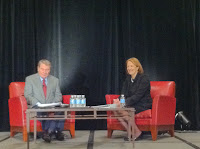I have been debating whether to answer this week's Book Blogger Hop question, sponsored by Crazy for Books: what book are you most looking forward to seeing published in 2011? Why are you anticipating that book?
As a bookseller, and more particularly as a buyer at my particular bookstore, I have access to a lot of pre-pub information that the general public doesn't have, but even so, I don't know most of the books being pubbed later than mid-summer or so. I only work about 5-6 months ahead, so I don't know at this point what is coming down the pike for the fall, when most publishers release their heaviest hitters. So on the one hand, it's kind of hard to say what I'm most anticipating when I only know the books from the first half of the year--it seems so unfair to eliminate the fall list from consideration!
On the other hand, I started reading 2011 books back in August and September of 2010, so while I *was* anticipating them, I can hardly say that I am still anticipating them after having read them.
And if I had a third hand, I'd probably just say that I should answer the damn question in the spirit it was meant and not sit here and agonize over my answer all day. It's not like world peace is riding on my correct response here. So the Anticipation Award goes to...
As a bookseller, and more particularly as a buyer at my particular bookstore, I have access to a lot of pre-pub information that the general public doesn't have, but even so, I don't know most of the books being pubbed later than mid-summer or so. I only work about 5-6 months ahead, so I don't know at this point what is coming down the pike for the fall, when most publishers release their heaviest hitters. So on the one hand, it's kind of hard to say what I'm most anticipating when I only know the books from the first half of the year--it seems so unfair to eliminate the fall list from consideration!
On the other hand, I started reading 2011 books back in August and September of 2010, so while I *was* anticipating them, I can hardly say that I am still anticipating them after having read them.
And if I had a third hand, I'd probably just say that I should answer the damn question in the spirit it was meant and not sit here and agonize over my answer all day. It's not like world peace is riding on my correct response here. So the Anticipation Award goes to...
Ann Patchett is a beautiful writer, in that she is both a writer who is beautiful and someone who writes beautifully. I'm not quite a completist when it comes to her work (I skipped Taft), but I've read the remainder of her novels, her memoir, her commencement address, and several magazine articles. She is intelligent and worldly and fiercely loyal and deeply compassionate (particularly towards dogs), and she brings all of these things to bear in her writing. If this seems like a somewhat personal evaluation of her, I suppose it is. I first met Patchett when I was a bookseller at Lemuria in Jackson, MS, and my boss had asked me to read The Magician's Assistant to see if it would be a good selection for the store's first edition club. I did, and it was, and I got to spend a lovely afternoon in her company. Our paths crossed a few times over the years I worked at that store, and later on, I fell in love with a man who has been her longtime friend.
State of Wonder is slated for a June 2011 publication from Harper Collins, and I happen to be roughly three-quarters of the way through my advance reading copy. In a word, it's stupendous. I said it before about one of her novels, and I'll say it again: it hits the literary trifecta of gorgeous prose, compelling characters, and a well-paced plot. Even now, I'm spacing out and shortening my reading intervals because I can't bear to let go of it. My long-suffering husband keeps pestering me to finish it so he can have a go at it. After all, it does seem unfair that I get to read it first when she is his friend, and I can just see the mental foot stompings he must be doing over not getting his way.
I'll end this post with the first few sentences of State of Wonder, just to tempt y'all:
The news of Anders Eckman's death came by way of Aerogram, a piece of bright blue airmail paper that served as both the stationery and, when folded over and sealed along the edges, the envelope. Who even knew they still made such things? This single sheet had traveled from Brazil to Minnesota to mark the passing of a man, a breath of tissue so insubstantial that only the stamp seemed to anchor it to this world.









